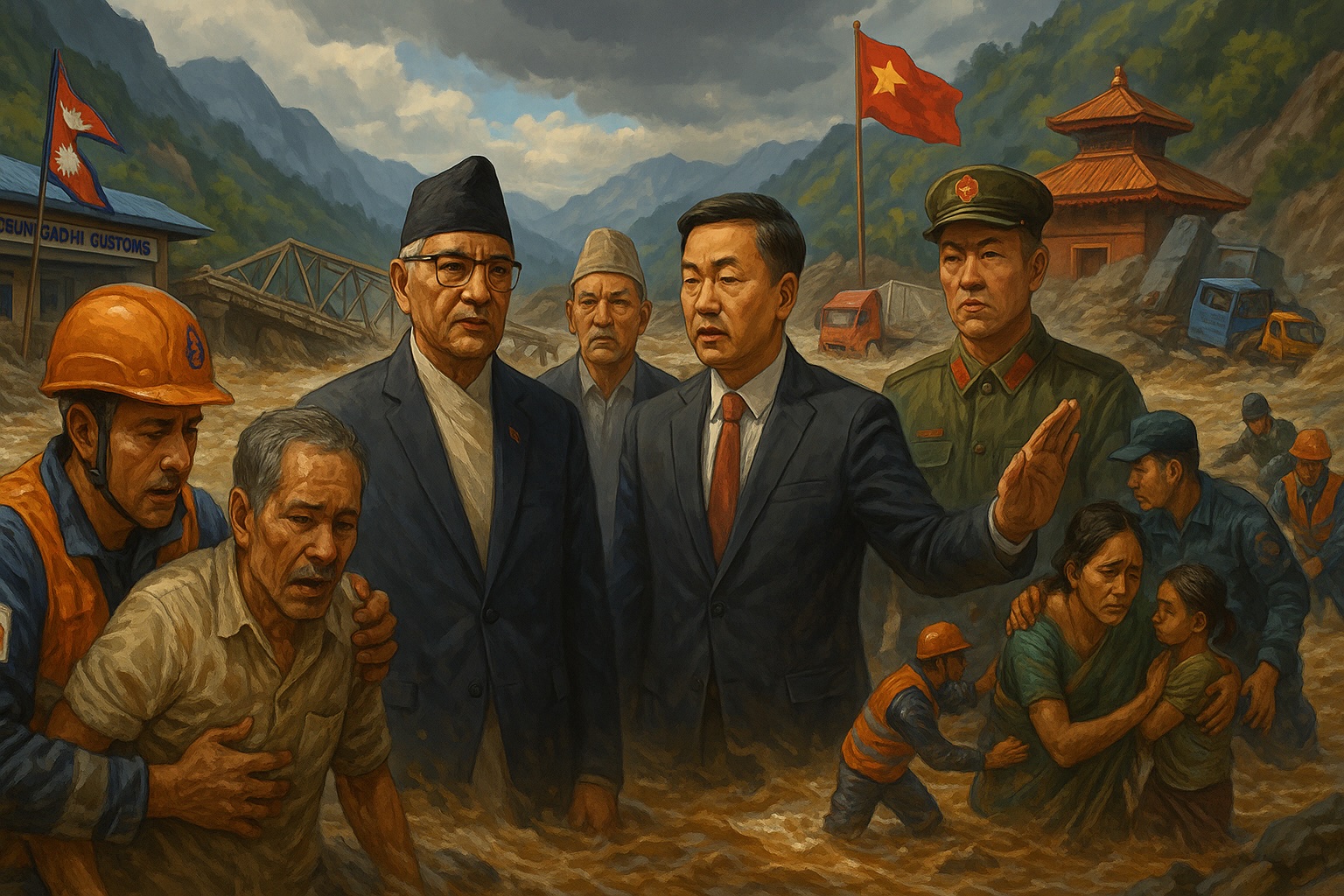We Warned You—Ignored Warnings, Now Nepal Pays the Price!
China’s Negligence Causes Predicted Catastrophe: Rasuwagadhi Flood Exposes Diplomatic Failures

July 8, Kathmandu—In an alarming manifestation of ignored warnings, the devastating flood at Nepal’s crucial Rasuwagadhi trade checkpoint has validated fears articulated months ago. Last winter, a team of journalists physically visited the Rasuwagadhi border crossing, meticulously documenting weak infrastructure, questionable Chinese construction practices, and administrative neglect. Despite explicitly alerting the Nepal government about imminent risks, including China’s overt attempt at territorial influence in sensitive regions like Humla and Mustang, the warnings were disregarded.
Now, Nepal faces severe consequences. The Miteri Bridge, a vital economic link connecting Nepal and China, was completely destroyed by floods in the Bhotekoshi River originating from China. Rasuwagadhi’s customs infrastructure has sustained catastrophic damage, severely crippling trade operations. The roadway between Syafrubesi and Rasuwagadhi is entirely blocked, bringing all commercial exchanges with China to an abrupt halt. Initial reports estimate trade losses amounting to nearly NPR 5 billion, with dozens of vehicles—including 35 electric vehicles and 23 cargo-laden containers—washed away.
This tragic scenario precisely mirrors the warnings voiced during the investigative visit by journalists. District Coordination Officer Ashok Kumar Ghimire openly criticized Chinese authorities last winter, highlighting weak and substandard infrastructure built by Chinese contractors. His harsh but accurate critique stressed that such irresponsibility from the Chinese side was putting local lives and national economic interests at grave risk. Today, the scale of destruction painfully validates his words.
In addition, Nepal had previously documented multiple instances of China’s aggressive tactics—ranging from Wolf Warrior Diplomacy (aggressive diplomatic threats) to Debt-trap Diplomacy (providing unsustainable loans to control national assets), Coercive Diplomacy (use of pressure to enforce compliance), and Salami Slicing Tactics (gradually capturing territories). Despite clear evidence and continuous documentation of these harmful approaches, Nepal’s diplomatic stance remained passive.
This diplomatic passivity allowed China’s Sharp Power—subtle yet potent manipulation of public opinion through education, media, and cultural exchanges—to flourish unchecked. Experts repeatedly emphasized the threat posed by Chinese Neo-imperialism, where economic aid becomes a means of indirect control. The growing reliance on Chinese-built infrastructure became a strategic vulnerability for Nepal, underscored painfully by the disaster unfolding in Rasuwagadhi.
The recent disaster has exposed Nepal’s extreme vulnerability to China’s influence and highlighted critical weaknesses in infrastructure. Rasuwagadhi’s Integrated Check Post (ICP), which was under construction at Timure, has experienced over 60 percent physical damage, destroying warehouses, retaining walls, inspection sheds, and crucial transportation infrastructure. 14 workers, including six Chinese nationals, are reported missing from the ICP site.
Moreover, the Rasuwagadhi Hydropower Project, a critical source of energy, has suffered significant damage. Around 200 megawatts of electricity production has halted, severely impacting the national grid. The facility's gates were washed away, and other power stations along the Trishuli corridor have also suspended operations, posing severe long-term economic repercussions.
Nepal’s Ministry of Physical Infrastructure and Transport has initiated a technical assessment of the widespread destruction, deploying teams to investigate damaged roads, bridges, and related structures. Minister Devendra Dahal has directed immediate and long-term plans for reconstruction, recognizing the critical necessity to restore trade and transportation routes quickly.
The human cost is equally profound—18 individuals remain missing, and 55 have been rescued amid hazardous conditions. The Nepal government, led by Prime Minister KP Sharma Oli, accompanied by Home Minister Ramesh Lekhak, Finance Minister Bishnu Poudel, and heads of security forces, has visited the disaster site, underscoring the belated urgency now being shown by authorities.
While the government assesses physical and economic damage, the broader question remains: Will Nepal finally confront China's aggressive diplomatic practices head-on? This disaster raises profound issues about sovereignty, diplomatic assertiveness, and strategic independence. The harsh lesson at Rasuwagadhi is a painful reminder of the cost of ignoring early warnings, particularly those clearly and responsibly voiced by independent journalists who had repeatedly highlighted impending risks.
The Federation of Nepalese Chambers of Commerce and Industry (FNCCI) has expressed deep concern, calling on the government to urgently assist flood victims and quickly restore trade infrastructure. Immediate rescue operations and diplomatic channels for evacuation and relief have been activated, yet the underlying diplomatic challenges with China remain unresolved.
Ultimately, Nepal faces a critical crossroads. The flood at Rasuwagadhi, which was clearly foreseen yet tragically unaddressed, exemplifies the dire consequences of ignoring strategic warnings and permitting unchecked influence from a powerful neighbor. As the waters recede, the critical question emerges: Will Nepal finally challenge China's coercive and aggressive diplomatic strategies—or continue to risk its people, sovereignty, and strategic autonomy in the shadow of overwhelming foreign influence?
Editorial Notice: We Warned—Act Now
For years, Nepal Aaja journalists have risked their safety in Mustang, Humla, and Rasuwa to expose Chinese-backed border encroachment and substandard infrastructure. Despite threats from radical pro-Chinese groups and indifferent authorities, we sounded the alarm well before the recent Rasuwa flood tragically confirmed our warnings.
We call on the Government of Nepal and all regulatory and security bodies to investigate immediately, hold the responsible parties accountable, and strengthen border safeguards. Protecting our citizens’ safety and national sovereignty demands urgent action. Nepal Aaja will continue to report with integrity; the state must act before another preventable tragedy unfolds.
– Editorial Board, Nepal Aaja
8 July 2025


![From Kathmandu to the World: How Excel Students Are Winning Big [Admission Open]](https://nepalaaja.com/index.php/img/70194/medium/excel-college-info-eng-nep-2342.jpg)


